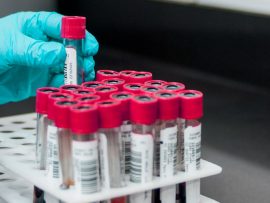Abstract During cardiopulmonary bypass (CPB), platelet activation and dysfunction are associated with adverse outcomes. Remote ischemic preconditioning (RIPC) has been shown to attenuate platelet activation. We evaluated the effects of..
Read MoreImpact of Corticosteroids on Cardiopulmonary Bypass Induced Inflammation in Children:A Meta-Analysis
Abstract Background Corticosteroids (CS) suppress the inflammatory response to cardiopulmonary bypass in children undergoing cardiac surgery. What is less clear is the impact of CS on the postoperative course. Methods..
Read MoreBackground It is unclear whether high-dose regimens of tranexamic acid in cardiac surgery (total dose, 80 to 100 mg/kg) confer a clinical advantage over low-dose regimens (total dose, approximately 20..
Read MoreIn 2002, Cribier et al. reported the first percutaneous transcatheter aortic valve replacement (TAVR) in a human subject. In this landmark manuscript, the authors described each step of the procedure..
Read MoreBackground Although corticosteroid prophylaxis in adult cardiac surgery has been studied extensively for 40 years, its role remains controversial, and the optimal dose remains uncertain. The objective of this meta-analysis..
Read MoreAbstract Platelet Mapping can measure both the degree of platelet inhibition and fibrinogen activation, was not originally designed to measure fibrinogen concentration. Traditional laboratory fibrinogen concentration testing requires around 60..
Read MoreAbstract Since the beginning of the pandemic Coronavirus Disease 2019 (COVID-19), calls were made for informed allocation of costly, limited health care resources such as extracorporeal membrane oxygenation (ECMO). At..
Read MoreThis 2020 International Consensus on Cardiopulmonary Resuscitation (CPR) and Emergency Cardiovascular Care Science With Treatment Recommendations on basic life support summarizes evidence evaluations performed for 20 topics that were prioritized..
Read MoreAbstract Cardioprotection encompasses a variety of strategies protecting the heart against myocardial injury that occurs during and after inadequate blood supply to the heart during myocardial infarction. While restoring reperfusion..
Read MoreObjective To review current literature evidence on outcomes of cardiac surgery in Jehovah’s Witness patients. Methods A comprehensive electronic literature search was done from 2010 to 20th August 2020 identifying..
Read MoreAbstract Extracorporeal life support (ECLS) can result in complications due to increased left ventricular (LV) afterload. The percutaneous ventricular assist device (PVAD) and intra-aortic balloon pump (IABP) are both considered..
Read MoreIntroduction In our institute, we began using peripheral veno-arterial (VA) extracorporeal membrane oxygenation (ECMO) in 2010, and peripheral veno-venous (VV) ECMO in 2015. This study aimed to describe clinical characteristics..
Read MoreIntroduction This study aimed to test a computer-driven cardiovascular model for the evaluation of the visceral flow during intra-aortic balloon pump (IABP) assistance. Methods The model includes a systemic and..
Read MoreAbstract Different arterial cannulation strategies are feasible for veno-arterial extracorporeal membrane oxygenation (VA-ECMO) in postcardiotomy shock. We aimed to analyze potential benefits and safety of different arterial cannulation strategies. We..
Read MoreAbstract Recirculation in venovenous extracorporeal membrane oxygenation (VV ECMO) leads to reduction in gas transfer efficiency. Studies of the factors contributing have been performed using in vivo studies and computational..
Read MoreAbstract Background Despite evidence suggesting detrimental effects of perioperative hyperoxia, hyperoxygenation remains commonplace in cardiac surgery. Hyperoxygenation may increase oxidative damage and neuronal injury leading to potential differences in postoperative..
Read MoreAbstract Objective To compare the hemodynamic effect of room temperature (cold) 4% albumin fluid bolus therapy (FBT) with body temperature (warm) albumin FBT. Design Prospective, before-after trial. Setting A tertiary..
Read MoreAbstract Objective To explore special coagulation characteristics and anticoagulation management in extracorporeal membrane oxygenation (ECMO)–assisted patients with coronavirus disease 2019 (COVID-19). Design Single-center, retrospective observation of a series of patients...
Read MoreAbstract Background A high hematocrit level in patients with erythrocytosis is linked with increased blood viscosity and increased risk of thromboembolism. Therefore, it is necessary to adequately lower the hematocrit..
Read MoreThis retrospective pilot study was undertaken to evaluate the effect of hemadsorption (HA) with CytoSorb (CytoSorbents Corporation, Monmouth Junction, NJ) on changes in inflammatory markers in patients undergoing aortic surgery...
Read MoreAbstract Coagulation Factor XII (fXII), the Hageman factor, is a procoagulant 80kDa glycoprotein with a plasma concentration of about 40 µg/mL (approximately 500 nmol/L). Plasma fXII is mainly synthesized in..
Read MoreAbstract Antiphospholipid Syndrome (APS) is an immunologic disorder that causes a state of hypercoagulability that can result in recurrent venous and arterial thromboses. Patients who experience APS may develop cardiac..
Read MoreAbstract This is a protocol for a Cochrane Review (Intervention). The objectives are as follows: To assess the benefits and harms of a higher versus lower blood pressure target during..
Read MoreAbstract The medical use of oxygen has been widely and frequently proposed for patients, especially those under critical care; however, its benefit and drawbacks remain controversial for certain conditions. The..
Read MoreAbstract The development of standards and guidelines by professional societies offers clinicians guidance toward providing evidence-based care. The ultimate goals of standards and guidelines are to standardize care and improve..
Read MoreAbstract Objective When patients deteriorate after decannulation from extracorporeal membrane oxygenation (ECMO), a second run of extracorporeal support may be considered. However, repeat cannulation can be difficult and poor outcomes..
Read MoreAbstract Dose adjustment of unfractionated heparin (UFH) anticoagulation is an important factor to reduce hemorrhagic events. High doses of heparin can be monitored by Activated Clotting Time (ACT). Because of..
Read MoreAbstract Many measures have been proposed for myocardial protection in pediatric congenital heart surgeries, but little data is available for China. This study investigates myocardial protection strategies in pediatric cardiopulmonary..
Read MoreAbstract Veno-arterial extracorporeal membrane oxygenation (ECMO) is a strong mechanical circulatory device for patients with hemodynamic deterioration due to cardiogenic shock, but its drawback is an increase in left ventricular..
Read MoreAbstract A 34-year-old African American man was brought to the trauma resuscitation area with 2 gunshot wounds to his right anterior chest below his clavicle and his left back. On..
Read More



















